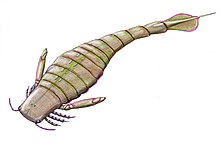Patrick Burn Formation
Appearance
| Patrick Burn Formation | |
|---|---|
| Stratigraphic range: Upper Llandovery | |
| Type | Formation |
| Location | |
| Region | Scotland |
| Country | |
The Patrick Burn Formation is a geologic formation in Scotland. This formation is main part of fossil site called as Birk Knowes. It preserves fossils dating back to the Silurian period.[1][2]
Description
This formation contains fossils from non-marine or marginal marine environment.[3] Site is closed by Scottish government agency Scottish Natural Heritage (now NatureScot), due to fossil robbery by amateur collector.[4][5]
Paleobiota
Arthropods
| Arthropods | |||
|---|---|---|---|
| Species | Notes | Images | |
| Slimonia acuminata | A slimonid eurypterid. |  | |
| Erettopterus bilobus | A pterygotid eurypterid. |  | |
| ?Nanahughmilleria lanceolata | An adelophthalmid eurypterid. | ||
| ?Hardieopterus lanarkensis | A hardieopterid eurypterid. | ||
| Loganamaraspis dunlopi | A chasmataspidid. | ||
| Cyamocephalus loganensis | A synziphosurine. |  | |
| Pseudoniscus falcatus | A synziphosurine. | ||
| Ainiktozoon loganense | A thylacocephalan. |  | |
| Ceratiocaris papilio | A phyllocarid. |  | |
Chordates
| Chordates | |||
|---|---|---|---|
| Species | Notes | Images | |
| Loganellia scotica | A loganelliid thelodont. |  | |
| Jamoytius kerwoodi | An enigmatic chordate. |  | |
See also
References
- Various Contributors to the Paleobiology Database. "Fossilworks: Gateway to the Paleobiology Database". Retrieved 17 December 2021.
- ^ D., Dineley; S., Metcalf (1999). Fossil Fishes of Great Britain. Geological Conservation Review Series. Vol. No. 16. Peterborough. ISBN 1-86107-470-0.
{{cite book}}:|volume=has extra text (help) - ^ Žigaitė, Živile; Goujet, Daniel (2012). "New observations on the squamation patterns of articulated specimens ofLoganellia scotica(Traquair, 1898) (Vertebrata: Thelodonti) from the Lower Silurian of Scotland". Geodiversitas. 34 (2): 253–270. doi:10.5252/g2012n2a1. ISSN 1280-9659. S2CID 73663549.
- ^ Tetlie, O. Erik; Braddy, Simon J. (2003). "The first Silurian chasmataspid, Loganamaraspis dunlopi gen. et sp. nov. (Chelicerata: Chasmataspidida) from Lesmahagow, Scotland, and its implications for eurypterid phylogeny". Earth and Environmental Science Transactions of the Royal Society of Edinburgh. 94 (3): 227–234. doi:10.1017/S0263593300000638. ISSN 1473-7116. S2CID 73596575.
- ^ "BBC - Radio 4 - Today - Fossils". www.bbc.co.uk. Retrieved 12 January 2023.
- ^ Hose, Thomas A. (1 April 2012). "3G's for Modern Geotourism". Geoheritage. 4 (1): 7–24. doi:10.1007/s12371-011-0052-y. ISSN 1867-2485. S2CID 144250723.
